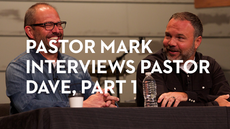Now as Peter went here and there among them all, he came down also to the saints who lived at Lydda. 33 There he found a man named Aeneas, bedridden for eight years, who was paralyzed. 34 And Peter said to him, “Aeneas, Jesus Christ heals you; rise and make your bed.” And immediately he rose. 35 And all the residents of Lydda and Sharon saw him, and they turned to the Lord.
36 Now there was in Joppa a disciple named Tabitha, which, translated, means Dorcas. She was full of good works and acts of charity. 37 In those days she became ill and died, and when they had washed her, they laid her in an upper room. 38 Since Lydda was near Joppa, the disciples, hearing that Peter was there, sent two men to him, urging him, “Please come to us without delay.” 39 So Peter rose and went with them. And when he arrived, they took him to the upper room. All the widows stood beside him weeping and showing tunics and other garments that Dorcas made while she was with them. 40 But Peter put them all outside, and knelt down and prayed; and turning to the body he said, “Tabitha, arise.” And she opened her eyes, and when she saw Peter she sat up. 41 And he gave her his hand and raised her up. Then calling the saints and widows, he presented her alive. 42 And it became known throughout all Joppa, and many believed in the Lord. 43 And he stayed in Joppa for many days with one Simon, a tanner.
“The time is fulfilled, and the kingdom of God is at hand,” declared Jesus (Mark 1:15). God’s kingdom represents his rule and reign on earth, especially in the hearts of men and women (John 18:36). The book of Acts captures the inauguration of the kingdom of God and its rapid advancement through the preaching of the gospel (Acts 1–2).
Luke now transitions from highlighting God’s work in and through Paul and turns the spotlight back to Peter. This week’s passage not only serves as a transition in his historical accounts, but it also sets the stage for the next great advancement of the gospel to the Gentiles in Acts 11–12.
We catch back up with Peter as he’s visiting people during his travels. While in a town called Lydda, Peter comes across a paralyzed man by the name of Aeneas, whom God heals in Jesus’ name. We are told that all the residents of Lydda and Sharon, upon seeing Aeneas healed, “turned to the Lord” (Acts 9:32–35).
Soon after, Peter was asked by disciples of a neighboring town to accompany them to Joppa. He was taken to an upper room of a house where a girl named Tabitha lay dead. Peter commanded her to rise. Stories of her resurrection spread throughout the town, and many believed in the Lord (Acts 9:36–42).
These miraculous occurrences didn’t happen at a stadium event with bright lights, a singing choir, or thumping bass. God miraculously healed Aeneas and Tabitha through Peter (Heb. 2:1–4). These miraculous occurrences didn’t take place to make Peter famous; these events were meant to bring glory to God and lead people to faith in Jesus Christ.
Let them remind us of God’s miraculous work in our own lives, graciously saving us in Christ, leading us in his wisdom, and answering prayers. Let us be quick to turn attention away from ourselves to Christ.
Questions
- Do you think Aeneas or Tabitha did anything that encouraged God to heal them? What do we learn about God, grace, and faith from their examples?
- Like Aeneas and Tabitha, have you experienced God’s power when you were helpless? If so, how?
- How are you trusting in God’s power today? Do you need prayer for God to do something you can’t do on your own?
This devotion is adapted from the Acts Study Guide: Chapter 6–11. Pick up a copy today for only $9.99. The Study Guide includes an 11-week curriculum with small group studies, group inductive studies, as well as 55 daily devotions for your personal or family worship.















